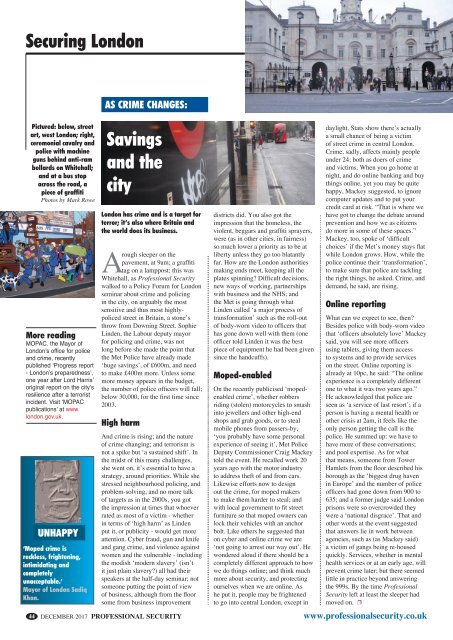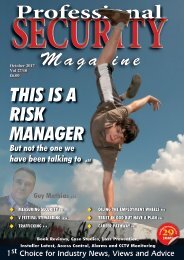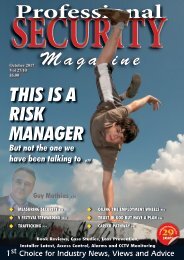Draft27-12
Create successful ePaper yourself
Turn your PDF publications into a flip-book with our unique Google optimized e-Paper software.
Securing London<br />
as crime changes:<br />
Pictured: below, street<br />
art, west London; right,<br />
ceremonial cavalry and<br />
police with machine<br />
guns behind anti-ram<br />
bollards on Whitehall;<br />
and at a bus stop<br />
across the road, a<br />
piece of graffiti<br />
Photos by Mark Rowe<br />
More reading<br />
MOPAC. the Mayor of<br />
London’s office for police<br />
and crime, recently<br />
published ‘Progress report<br />
- London’s preparedness’,<br />
one year after Lord Harris’<br />
original report on the city’s<br />
resilience after a terrorist<br />
incident. Visit ‘MOPAC<br />
publications’ at www.<br />
london.gov.uk.<br />
44<br />
UNHAPPY<br />
‘Moped crime is<br />
reckless, frightening,<br />
intimidating and<br />
completely<br />
unacceptable.’<br />
Mayor of London Sadiq<br />
Khan.<br />
Savings<br />
and the<br />
city<br />
London has crime and is a target for<br />
terror; it’s also where Britain and<br />
the world does its business.<br />
A<br />
rough sleeper on the<br />
pavement, at 9am; a graffiti<br />
tag on a lamppost; this was<br />
Whitehall, as Professional Security<br />
walked to a Policy Forum for London<br />
seminar about crime and policing<br />
in the city, on arguably the most<br />
sensitive and thus most highlypoliced<br />
street in Britain, a stone’s<br />
throw from Downing Street. Sophie<br />
Linden, the Labour deputy mayor<br />
for policing and crime, was not<br />
long before she made the point that<br />
the Met Police have already made<br />
‘huge savings’, of £600m, and need<br />
to make £400m more. Unless some<br />
more money appears in the budget,<br />
the number of police officers will fall;<br />
below 30,000, for the first time since<br />
2003.<br />
High harm<br />
And crime is rising; and the nature<br />
of crime changing; and terrorism is<br />
not a spike but ‘a sustained shift’. In<br />
the midst of this many challenges,<br />
she went on, it’s essential to have a<br />
strategy, around priorities. While she<br />
stressed neighbourhood policing, and<br />
problem-solving, and no more talk<br />
of targets as in the 2000s, you got<br />
the impression at times that whoever<br />
rated as most of a victim - whether<br />
in terms of ‘high harm’ as Linden<br />
put it, or publicity - would get more<br />
attention. Cyber fraud, gun and knife<br />
and gang crime, and violence against<br />
women and the vulnerable - including<br />
the modish ‘modern slavery’ (isn’t<br />
it just plain slavery?) all had their<br />
speakers at the half-day seminar; not<br />
someone putting the point of view<br />
of business, although from the floor<br />
some from business improvement<br />
DECEMBER 2017 PROFESSIONAL SECURITY<br />
districts did. You also got the<br />
impression that the homeless, the<br />
violent, beggars and graffiti sprayers,<br />
were (as in other cities, in fairness)<br />
so much lower a priority as to be at<br />
liberty unless they go too blatantly<br />
far. How are the London authorities<br />
making ends meet, keeping all the<br />
plates spinning? Difficult decisions,<br />
new ways of working, partnerships<br />
with business and the NHS; and<br />
the Met is going through what<br />
Linden called ‘a major process of<br />
transformation’ such as the roll-out<br />
of body-worn video to officers that<br />
has gone down well with them (one<br />
officer told Linden it was the best<br />
piece of equipment he had been given<br />
since the handcuffs).<br />
Moped-enabled<br />
On the recently publicised ‘mopedenabled<br />
crime’, whether robbers<br />
riding (stolen) motorcycles to smash<br />
into jewellers and other high-end<br />
shops and grab goods, or to steal<br />
mobile phones from passers-by,<br />
‘you probably have some personal<br />
experience of seeing it’, Met Police<br />
Deputy Commissioner Craig Mackey<br />
told the event. He recalled work 20<br />
years ago with the motor industry<br />
to address theft of and from cars.<br />
Likewise efforts now to design<br />
out the crime, for moped makers<br />
to make them harder to steal; and<br />
with local government to fit street<br />
furniture so that moped owners can<br />
lock their vehicles with an anchor<br />
bolt. Like others he suggested that<br />
on cyber and online crime we are<br />
‘not going to arrest our way out’. He<br />
wondered aloud if there should be a<br />
completely different approach to how<br />
we do things online; and think much<br />
more about security, and protecting<br />
ourselves when we are online. As<br />
he put it, people may be frightened<br />
to go into central London, except in<br />
daylight. Stats show there’s actually<br />
a small chance of being a victim<br />
of street crime in central London.<br />
Crime, sadly, affects mainly people<br />
under 24; both as doers of crime<br />
and victims. When you go home at<br />
night, and do online banking and buy<br />
things online, yet you may be quite<br />
happy, Mackey suggested, to ignore<br />
computer updates and to put your<br />
credit card at risk. “That is where we<br />
have got to change the debate around<br />
prevention and how we as citizens<br />
do more in some of these spaces.”<br />
Mackey, too, spoke of ‘difficult<br />
choices’ if the Met’s money stays flat<br />
while London grows. How, while the<br />
police continue their ‘transformation’,<br />
to make sure that police are tackling<br />
the right things, he asked. Crime, and<br />
demand, he said, are rising.<br />
Online reporting<br />
What can we expect to see, then?<br />
Besides police with body-worn video<br />
that ‘officers absolutely love’ Mackey<br />
said, you will see more officers<br />
using tablets, giving them access<br />
to systems and to provide services<br />
on the street. Online reporting is<br />
already at 10pc, he said: “The online<br />
experience is a completely different<br />
one to what it was two years ago.”<br />
He acknowledged that police are<br />
seen as ‘a service of last resort’; if a<br />
person is having a mental health or<br />
other crisis at 2am, it feels like the<br />
only person getting the call is the<br />
police. He summed up: we have to<br />
have more of these conversations;<br />
and pool expertise. As for what<br />
that means, someone from Tower<br />
Hamlets from the floor described his<br />
borough as the ‘biggest drug haven<br />
in Europe’ and the number of police<br />
officers had gone down from 900 to<br />
635; and a former judge said London<br />
prisons were so overcrowded they<br />
were a ‘national disgrace’. That and<br />
other words at the event suggested<br />
that answers lie in work between<br />
agencies, such as (as Mackey said)<br />
a victim of gangs being re-housed<br />
quickly. Services, whether in mental<br />
health services or at an early age, will<br />
prevent crime later; but there seemed<br />
little in practice beyond answering<br />
the 999s. By the time Professional<br />
Security left at least the sleeper had<br />
moved on. p<br />
www.professionalsecurity.co.uk<br />
p44 London 27-<strong>12</strong>.indd 1 17/11/2017 11:27










